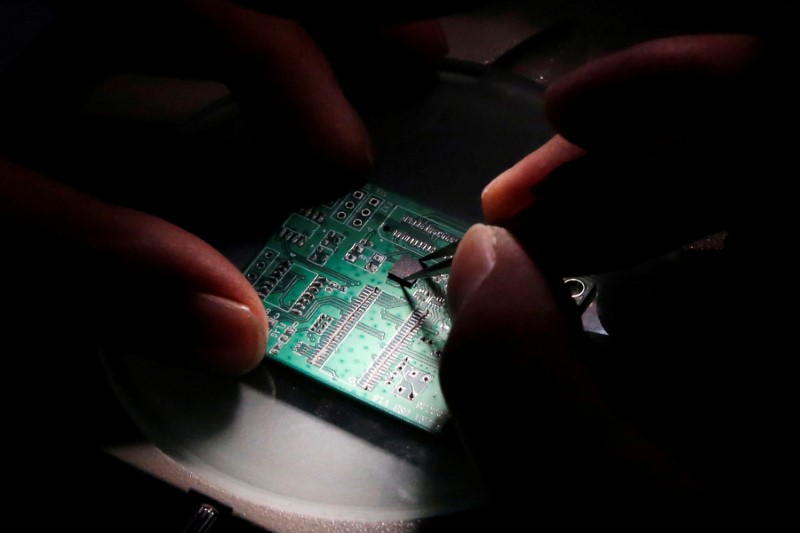By Elias Glenn and Cate Cadell
BEIJING (Reuters) - China is looking to accelerate plans to develop its domestic semiconductor market amid a fierce trade stand-off with the United States and a U.S. ban on sales to Chinese phone maker ZTE that has underscored the country's reliance on imported chips.
Senior Chinese officials have held meetings this week with industry bodies, regulators and the country's powerful chip fund about speeding up already aggressive plans for the sector, two people with direct knowledge of the talks told Reuters.
The talks underscore China's concern about its reliance on imported chips from global names such as Qualcomm Inc (O:QCOM) and Intel Corp (O:INTC), aggravated by a worsening dispute with the United States centered on cutting-edged tech.
"In the last few days senior Chinese officials have met to discuss plans to speed up the development of the chip industry," one person with knowledge of the talks said, asking not to be named because of the sensitivity of the matter.
China has already made the semiconductor market a key priority under its "Made in China 2025" strategy to cut reliance on foreign technologies and create its own domestic champions.
That goal has been given fresh urgency after a U.S. ban on sales of products – including chips – to Chinese phone maker ZTE Corp (SZ:000063) roiled the firm, which uses mainly U.S. chips in its smartphones.
A second person with knowledge of the talks said senior officials had met with key ministries, as well as the National Integrated Circuitry Investment Fund, "this week" to discuss speeding up plans due to recent trade tensions.
China's Ministry of Commerce and the Ministry of Industry and Information Technology (MIIT) did not immediately respond to faxed requests for comment late on Thursday. The IC Fund did not immediately respond to requests for comment.
The seven-year ban on U.S. firms selling parts to ZTE comes at a time when the two countries have threatened each other with tens of billions of dollars in tariffs in recent weeks, fanning worries of a full blown trade war.
Washington said ZTE had violated an agreement reached after it was caught illegally shipping goods to Iran.
ZTE, which has chips from U.S. firm Qualcomm in an estimated 50-65 percent of its phones, is now facing a struggle to save its smartphone business as it looks to find new supplies.
That over-reliance has spooked China - though most industry insiders said shifting production back home would not be easy.
"China won't allow the U.S. to use chips as a stick against it. China can take steps to replace foreign-made chips with domestic," the country's hawkish Global Times newspaper said in a commentary this week.
"The Trump administration is helping us Chinese make such a decision."
The move could boost domestic firms including Tsinghua Group, Huawei [HWT.UL], Unisplendour Corp Ltd (SZ:000938), Semiconductor Manufacturing International Corp (HK:0981), and smaller rival Jiangsu Changjiang Electronics Technology Co (SS:600584).
China already wants locally-made chips inside 40 percent all smartphones in the domestic market by 2025 and is betting billions of dollars on domestic "champions" to get there. It also has targets in robotics, electric cars and drugs.
Analysts say money is now "raining down" from Beijing and state-backed funds to support the chip market, while the country's state chip fund, known as the "Big Fund", raised an estimated $32 billion in a new round of financing last month.

China's chip push is at the heart of the trade stand-off with the United States. Beijing wants to boost its tech prowess and escape from its reliance on U.S. products. Washington sees the move as a direct challenge to its own technology leaders and a potential security threat as China's power grows.